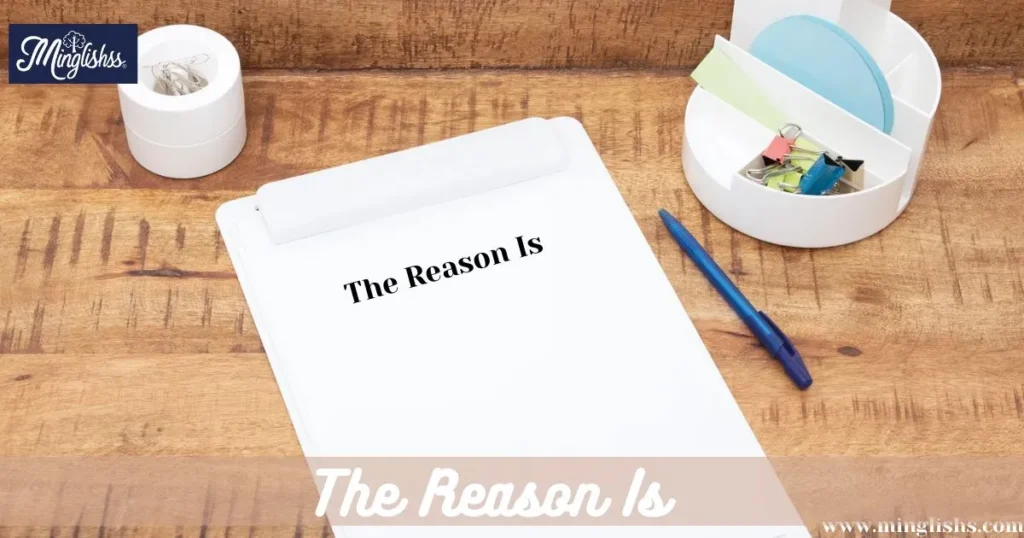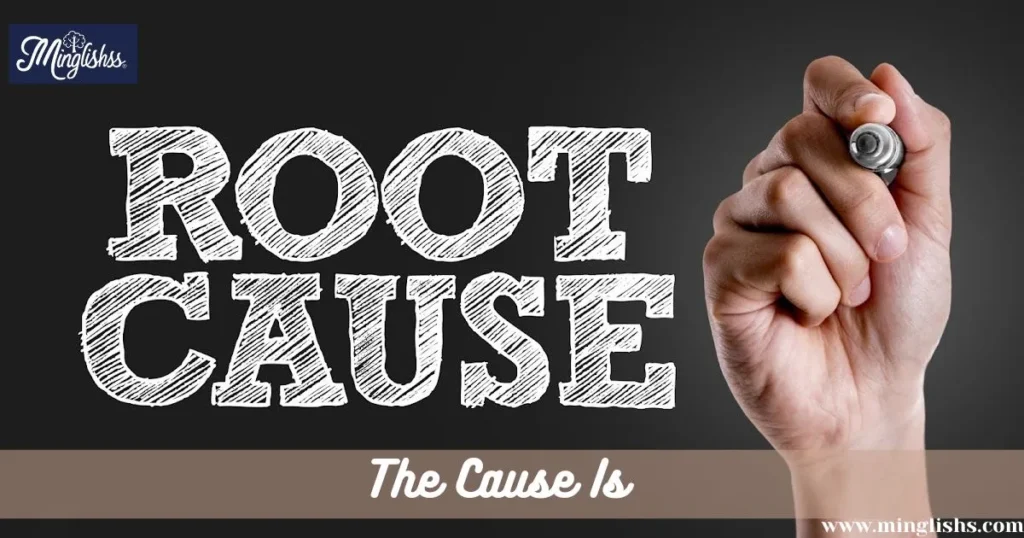“Expressing ideas in different ways keeps communication fresh and engaging.”
Language shapes how we connect with others and convey our thoughts. One common phrase that often pops up in our conversations and writing is “this is because.” While it’s effective in explaining reasoning, using the same expression repeatedly can lead to monotony and hinder the flow of your communication. Finding alternative phrases can not only enhance your vocabulary but also make your conversations more interesting and engaging.
In this blog post, we will explore a range of alternatives to “this is because,” providing you with versatile options that can fit various contexts. Whether you’re in a professional setting, casual conversation, or academic discussion, having a diverse set of phrases at your disposal will help you articulate your thoughts more clearly and persuasively.
So, if you’re ready to elevate your communication skills and express your ideas with more flair, read on! By the end of this article, you’ll have 35 different ways to say “this is because,” complete with scenarios and tips to help you integrate them seamlessly into your speech and writing.
Alternative Phrases
1. The Reason Is

Scenario: You’re explaining why your team missed a deadline during a meeting.
Subject Explanation: This phrase provides a clear and straightforward way to present a reason. It’s perfect for formal discussions or when you need to be precise. You might say, “The reason is that we underestimated the project timeline.”
Additional Tips: Always follow up with specific details to reinforce your explanation. This helps your audience understand the context better.
2. This Is Due To
Scenario: You’re discussing the challenges your department is facing.
Subject Explanation: “This is due to” conveys causation and is suitable for both written and spoken communication. For instance, “This is due to a lack of resources.”
Additional Tips: Use this phrase when you want to emphasize external factors influencing a situation. It can enhance clarity in your communication.
3. This Happens As a Result Of

Scenario: You’re analyzing the results of a marketing campaign.
Subject Explanation: This phrase emphasizes the cause-and-effect relationship, making it clear why something has occurred. You could say, “This happens as a result of our targeted advertising strategy.”
Additional Tips: Use this when discussing outcomes that stem from specific actions. It provides a clear link between cause and effect.
4. The Explanation Is
Scenario: A colleague asks why certain decisions were made in a project.
Subject Explanation: This phrase directly leads into the rationale behind your decisions, making it easy to understand. For example, “The explanation is based on market research.”
Additional Tips: Be concise and clear in your explanations to ensure your audience grasps your reasoning.
5. This Comes From

Scenario: You’re sharing your insights on a recent trend in your industry.
Subject Explanation: “This comes from” indicates the source of an idea or trend. You might say, “This comes from our customer feedback surveys.”
Additional Tips: Use this phrase to provide context and background for your ideas, enhancing the depth of your discussion.
6. This Is Attributed To
Scenario: You’re discussing why sales increased last quarter.
Subject Explanation: This phrase is often used in formal contexts to attribute a cause to a specific factor. For example, “This is attributed to our new sales strategy.”
Additional Tips: Make sure to provide evidence or data to back up your claim when using this phrase.
7. The Cause Is

Scenario: A student asks why a certain topic was covered in class.
Subject Explanation: This straightforward phrase directly identifies causation, such as “The cause is to prepare you for the upcoming exam.”
Additional Tips: Use it when clarity is essential, particularly in educational settings.
8. This Is Linked To
Scenario: In a team meeting, you’re explaining a relationship between two projects.
Subject Explanation: This phrase shows a connection between two ideas or events. For instance, “This is linked to the successful completion of the previous project.”
Additional Tips: Clearly define the connection for your audience to understand the relationship effectively.
Other Ways to Say “Thank You for Your Consideration”
9. This Is Based On
Scenario: You’re providing the rationale behind a new policy at work.
Subject Explanation: This phrase indicates that the following information stems from specific data or assumptions. You could say, “This is based on employee feedback.”
Additional Tips: Support your statement with relevant data to lend credibility.
10. The Underlying Factor Is
Scenario: Discussing performance issues with a team.
Subject Explanation: This phrase emphasizes the root cause of an issue. For example, “The underlying factor is the lack of communication.”
Additional Tips: Use this phrase to delve deeper into complex issues, encouraging thorough exploration.
11. This Stems From
Scenario: Reflecting on personal experiences in a discussion.
Subject Explanation: It indicates the source of a thought or emotion, such as “This stems from my past experiences.”
Additional Tips: Share anecdotes or examples to make your point more relatable.
12. This Arises From
Scenario: Explaining new ideas that have emerged in a brainstorming session.
Subject Explanation: This phrase indicates that something has emerged due to specific conditions. For instance, “This arises from our desire to innovate.”
Additional Tips: Use it to highlight new developments in discussions.
13. This Can Be Attributed To
Scenario: Presenting research findings in a seminar.
Subject Explanation: This emphasizes that the information is linked to a specific source or cause. For example, “This can be attributed to recent changes in legislation.”
Additional Tips: Always provide supporting evidence to back your claims.
14. This Is Caused By
Scenario: Addressing a customer’s complaint about a product.
Subject Explanation: This straightforward phrase identifies the cause of a problem, such as “This is caused by a manufacturing error.”
Additional Tips: Remain empathetic while explaining the cause to maintain good customer relations.
15. This Is Rooted In
Scenario: Analyzing social issues in a community meeting.
Subject Explanation: This phrase emphasizes foundational causes, like “This is rooted in historical inequities.”
Additional Tips: Provide context to deepen understanding of complex topics.
16. This Derives From
Scenario: Discussing a concept in a lecture.
Subject Explanation: This indicates the origin of an idea or practice. For example, “This derives from ancient philosophical teachings.”
Additional Tips: Use examples to clarify the origins you’re discussing.
17. This Is Influenced By
Scenario: Talking about factors affecting project outcomes.
Subject Explanation: It highlights external factors that contribute to a situation, such as “This is influenced by market trends.”
Additional Tips: Be specific about the influences you are referencing for clarity.
18. This Is Consequently
Scenario: Summarizing a report’s findings.
Subject Explanation: It indicates a direct outcome from an action. You might say, “This is consequently why we need to adjust our approach.”
Additional Tips: Use it to effectively summarize your points.
19. This Is Supported By
Scenario: Presenting a case during a negotiation.
Subject Explanation: This indicates that evidence backs up a claim, like “This is supported by our previous successes.”
Additional Tips: Reference specific examples or data to reinforce your argument.
20. This Is Justified By
Scenario: Explaining a controversial decision in a meeting.
Subject Explanation: This shows that your explanation is validated by certain facts or principles, such as “This is justified by our commitment to quality.”
Additional Tips: Provide clear evidence or reasoning to support your statement.
21. This Is Due to the Fact That
Scenario: Providing detailed reasoning in a report.
Subject Explanation: This elaborates on the reason in a more complex manner, like “This is due to the fact that we have limited resources.”
Additional Tips: Ensure you break down complex sentences for easier comprehension.
22. This Is Explained By
Scenario: Clarifying complex concepts in a presentation.
Subject Explanation: This introduces an explanation that follows logically. For example, “This is explained by our new data analysis methods.”
Additional Tips: Be prepared to simplify complex ideas to maintain clarity.
23. This Is Determined By
Scenario: Discussing variables affecting project timelines.
Subject Explanation: This emphasizes the deciding factors, such as “This is determined by our available manpower.”
Additional Tips: Clearly identify these variables for your audience.
24. This Is Facilitated By
Scenario: Talking about collaboration in a team project.
Subject Explanation: This indicates that something has been made easier by specific factors, like “This is facilitated by our use of project management software.”
Additional Tips: Mention any tools or strategies that helped the process.
25. This Reflects
Scenario: Analyzing consumer behavior trends.
Subject Explanation: This suggests that the following information mirrors a larger trend, such as “This reflects changing preferences among our customers.”
Additional Tips: Use relevant examples to illustrate the reflection.
26. This Is Illustrated By
Scenario: Presenting case studies in a workshop.
Subject Explanation: This indicates that a point is clarified through specific examples. For instance, “This is illustrated by the success of our last campaign.”
Additional Tips: Always choose relevant and clear examples to enhance understanding.
27. This Is Characterized By
Scenario: Discussing features of a new product.
Subject Explanation: This phrase highlights specific traits, like “This is characterized by its user-friendly interface.”
Additional Tips: Be descriptive to give a vivid picture of the characteristics.
28. This Can Be Summed Up By
Scenario: Wrapping up a discussion.
Subject Explanation: This phrase provides a concise summary of previous points, such as “This can be summed up by our commitment to excellence.”
Additional Tips: Use it effectively to transition to conclusions or summaries.
29. This Is Found In
Scenario: Discussing literature in a book club.
Subject Explanation: This indicates that the information is present in a specific source, like “This is found in chapter three of the book.”
Additional Tips: Ensure that you reference the correct source for accuracy.
30. This Is Evidenced By
Scenario: Presenting research findings in a study.
Subject Explanation: This indicates that evidence supports a claim, such as “This is evidenced by the data we collected.”
Additional Tips: Always present clear and credible evidence to support your statements.
31. This Is Correlated With
Scenario: Discussing statistics in a report.
Subject Explanation: This indicates a relationship between two variables, like “This is correlated with an increase in consumer interest.”
Additional Tips: Be clear about the nature of the correlation for better understanding.
32. This Is Triggered By
Scenario: Analyzing customer complaints.
Subject Explanation: This phrase suggests that a specific event or condition leads to another. For instance, “This is triggered by a change in pricing.”
Additional Tips: Provide context to clarify the triggering factors.
33. This Is A Result Of
Scenario: Analyzing team dynamics in a project.
Subject Explanation: This phrase succinctly indicates the outcome of a situation, such as “This is a result of improved communication.”
Additional Tips: Support your statements with examples to make them more relatable.
34. This Has Been Shown To
Scenario: Presenting findings from a study.
Subject Explanation: This indicates evidence from research, like “This has been shown to increase productivity.”
Additional Tips: Cite specific studies or data to enhance your credibility.
35. This Is Predicated On
Scenario: Discussing assumptions in a strategic plan.
Subject Explanation: This phrase emphasizes the foundational assumptions of a statement, such as “This is predicated on our current market analysis.”
Additional Tips: Clearly outline these assumptions to provide context.
Pros and Cons
Pros
- Variety in Communication: Using alternative phrases keeps your language fresh and engaging.
- Enhanced Clarity: Different phrases can clarify meaning and improve understanding.
- Improved Vocabulary: Expanding your vocabulary allows for better expression of ideas.
Cons
- Potential Confusion: Some alternatives may not convey the same meaning, leading to misunderstandings.
- Overcomplicating Messages: Using complex phrases can sometimes muddle the message rather than clarify it.
- Inconsistency: Switching phrases too frequently can disrupt the flow of conversation.
Answers To Key Questions “This Is Because”
1. Why should I avoid using “this is because” too often?
Using “this is because” repeatedly can make your speech or writing sound monotonous. Exploring alternatives adds variety and keeps your audience engaged.
2. How can I choose the right alternative phrase?
Consider the context and audience. Some phrases are more suitable for formal settings, while others work better in casual conversations.
3. Can these phrases be used interchangeably?
While some phrases convey similar meanings, they may carry different connotations or levels of formality. Always ensure the phrase fits the context.
4. What if I’m unsure about using a new phrase?
Practice using new phrases in low-stakes situations, like casual conversations, to build confidence before using them in formal settings.
5. How can I expand my vocabulary further?
Reading diverse materials, listening to podcasts, and engaging in conversations can expose you to new phrases and expressions.
Conclusion
Finding different ways to say “this is because” can significantly enhance your communication skills. Whether you’re in a formal meeting, a casual chat, or presenting your ideas, having a variety of expressions at your disposal helps convey your thoughts more effectively. Remember to choose phrases that fit the context and audience, ensuring that your message is clear and engaging.
By incorporating these alternatives into your daily conversations and writing, you’ll not only improve your vocabulary but also enhance the overall quality of your communication. So go ahead, practice these phrases, and watch how your conversations become more dynamic and interesting!

Hi, I’m Lauren Reynolds: I bring creativity to English lessons, mixing fun with learning. My goal is to inspire students to explore and enjoy the language.










